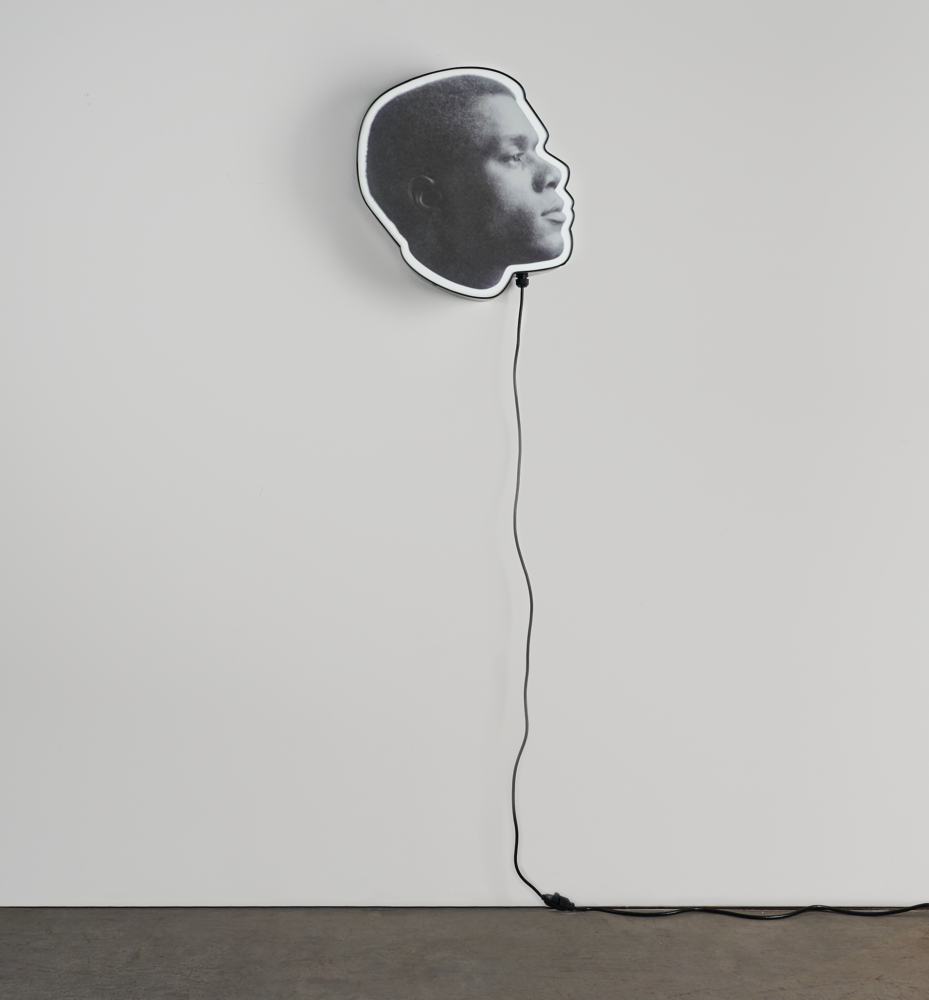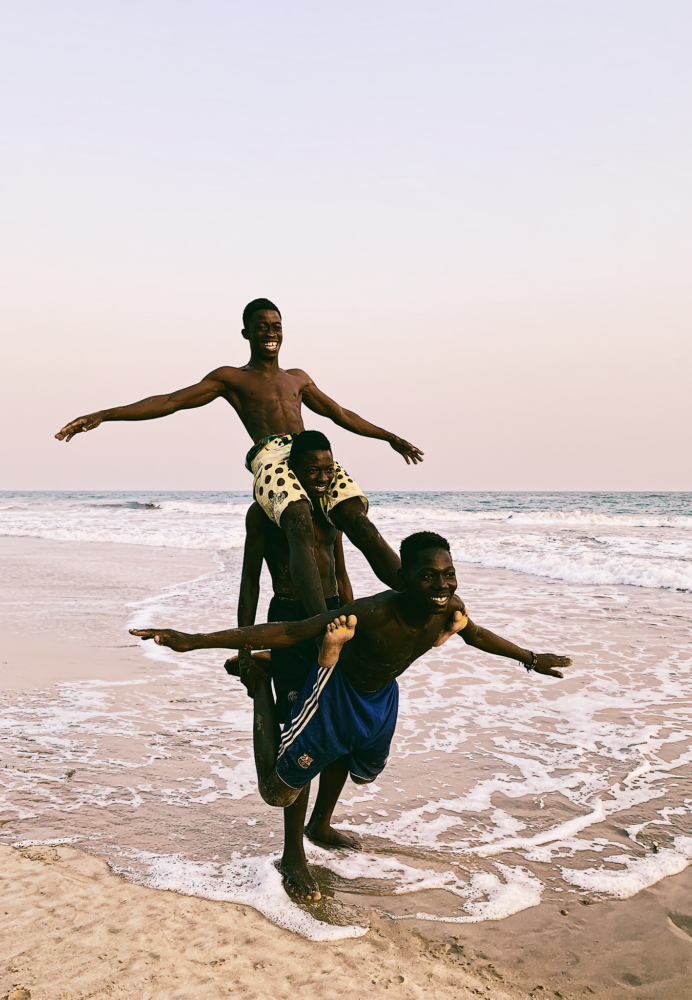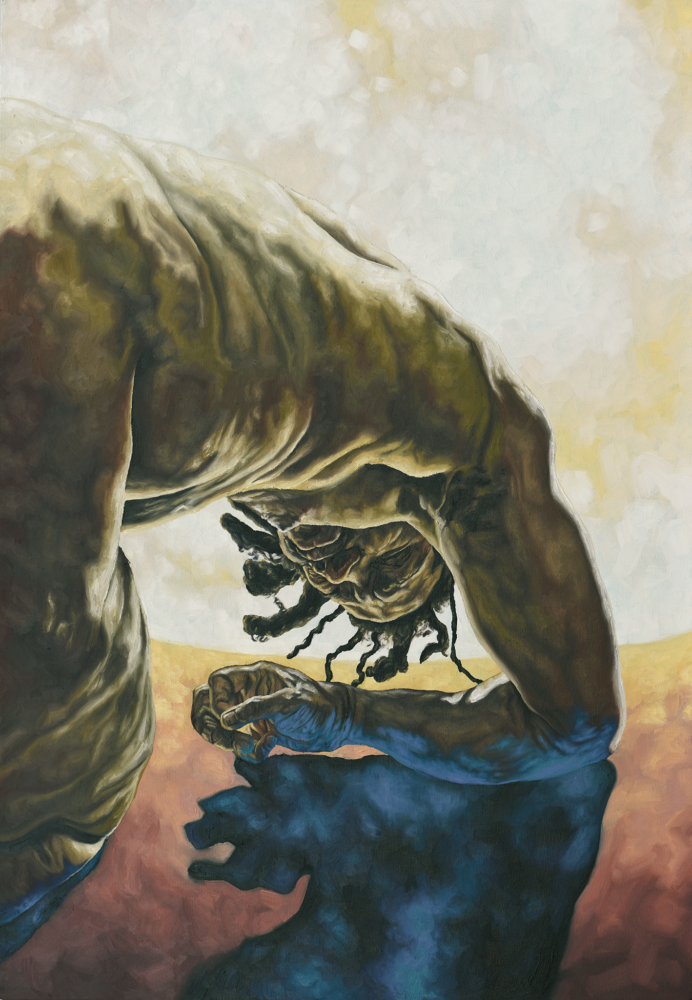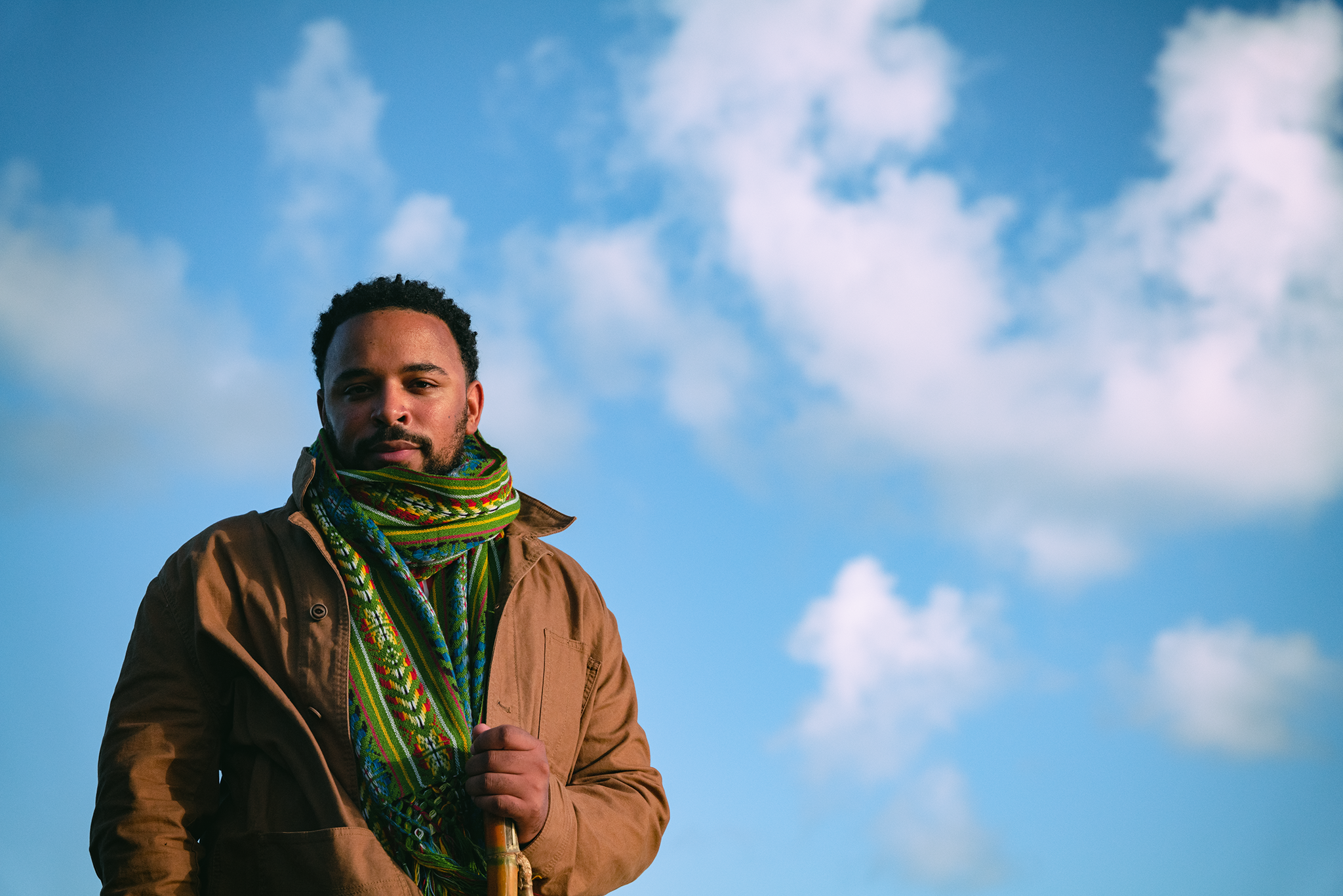The visual artist sees artmaking in all its forms as a metaphysical deep dive into spirituality, community building, and connection.
Images by Greg Hatton
The artist Glenn Lutz has a gift for dialogue, particularly in fostering intentional conversations and communities through conversation. With his latest book, There’s Light: Artworks & Conversations Examining Black Masculinity, Identity & Mental Well-Being, Lutz gathers insights from interviews and artworks from Steve McQueen, Mark Bradford, Glenn Ligon, Brontez Purnell, and the late Virgil Abloh. In November 2022, the Kāne‘ohe-based photographer Greg Hatton spent the day with Lutz to talk about his California upbringing, the islands, and the sanctuary that is artmaking.
Being African American myself, your book, There’s Light, resonates with me a lot for many reasons. The book is described as being “for us,” Black or African American men. You make a clear point to share that it’s for this audience, but it’s intended for everybody to take in and process also.
As I said in the book’s preface, there’s a universality we all share. Yes, I am Black and a male, these things are inherited. There are things that people see when they look at me, and that experience has lent itself — or that identity rather — has lent itself to specific experiences and microaggressions and situations that I’ve encountered. The stories within There’s Light are for young Black men who are experiencing very tumultuous times within the States and abroad after the murder of George Floyd. Very specific questions, fears, concerns, and just a demanding for change that are specific to not only Black men, but to Black women, too. Yet we’ve seen how collectively around the world we’ve understood that injustice. Even though the stories are very specific culturally, specifically to the Black male experience, we can relate. How traumas affect us, that is something that is universal. That was the intention. I wanted to give something to young Black men that I would’ve loved to have read about people who look like me and how they maneuvered through life, kind of a bible of sorts. But that doesn’t mean that it excludes anybody else from gaining something from the book.
The book is really about communication and storytelling. The conversations feel a lot like you’re speaking to somebody directly. What is the importance of storytelling in our time, the past, and for the future?
Storytelling is one of the things that makes us human. We think of folklore, of telling stories around the campfire. We think of the rich history, theatrically, putting on plays, sharing wisdom from the ancestors through story. This has been done through millennia, even with artwork. Through hieroglyphics. I feel very small even talking about the importance of storytelling. Through fundamentally seeing the importance of story and placing it within a context and giving it the reverence it deserves. Obviously, religions have been founded upon this and pass their stories down. When we lose that ability to listen or to share and to listen with empathy and compassion, to hear and to take it in, then we’re on a path to destruction. Because it then becomes very individualistic which is something we see in Western culture. It becomes a “me versus them” rather than an “us.”

There’s so much to say about the global climate crisis now, what this world is looking like compared to when we were kids. Coming from Southern California, what have you felt by coming to Hawai‘i?
I could say that it’s healing. I can say physically being in touch with nature, taking my shoes and socks off and being connected — physically skin to earth — is a very healing and grounding process. Being electromagnetic beings, connected to the earth and connected to the sun, it’s who we are, you know, as beings. We know a lot of people have lost touch with that all around the world. Here, the culture, especially being within water, which is where we came from, it’s hard to put that into words… It’s being. I think of the words “existing” and “sharing.” I think of the gratitude to be alive at a specific moment. I think about the history of humanity. That we’ve all seen the sun. Whether you’re thinking about Dr. Martin Luther King Jr. or King Kamehameha, whoever has lived and touched this earth, this is the same earth they’ve walked upon, you know? To partake of that is a major gift that I don’t think people take the time to really sit with or be in gratitude for. Because this is not promised. This life isn’t a promised thing. It’s not even something that all get to experience, just the freedom to be in nature. It’s big, it’s expansive, right? I feel very, very small next to that question.
Going back to art, it shapes the world that we live in. Art has a very specific purpose or place, or meaning to the individual artist. I know that there are pieces of my art that feed me for different reasons. There are pieces of my work that I haven’t understood yet. I want to know what your art does for you?
For me, contemporary art, whether it is a sculpture or painting that I’ve done in the past is usually an exploration. I’m interested in something being channeled within me, and much more interested in trying to understand it later. Same kind of thing goes for poetry. I think writing lyrics, it’s a form of poetry and my favorite poetry has just flown out of me. I have no idea what it even means. You just feel like a conduit. And then in the future you can decipher it and be like, “Whoa!” Like, “I didn’t even realize that’s what I was saying.” You’re in tune with the infinite, and you’re also allowing your subconscious to speak and to kind of get out of its own way. I remember hearing a poet say something along the lines of, “If I can’t remember it, then maybe it wasn’t that important.” If I didn’t have a piece of paper and I couldn’t remember it, then I let it go.
As for my sculptural work and performance art, I did a piece that I thought was about policing and then later on, I don’t think that’s what it was in the performance. I felt something very different. It was maybe about policing in a metaphorical sense, as I know nothing about being a police officer. But it was policing, maybe, my own thoughts or serving as sort of a gatekeeper of who I am, saying, “All right, let’s not do this,” or, “Let’s not explore that.”
There’s so many different purposes that art serves. It’s one of the things that makes us human and connects us to the infinite and whatever spiritual practice that you adhere to, if you have one. It’s this idea of creation and the beauty we see around us and, you know, the grand architect of the universe, or whatever phrasing you want to use. But the beauty we see, we’re partaking in that while being an artist. Without art, I would not be alive. I can say that definitively. If I did not have artwork, I would not be alive.
There’s so many different purposes that art serves. It’s one of the things that makes us human and connects us to the infinite.
Glenn Lutz

What is the importance of hearing the stories of those who were here before us, as well as those among us, our contemporaries and friends? Considering the idea of “talk story,” the sharing of knowledge. Your book is full of this.
That’s what makes life worth living. Getting out of yourself, right? A life focused on yourself and your things is a small life. We don’t need to necessarily always learn from someone’s story. We don’t need to be given wisdom that affects our life from somebody else’s story. But what if you just listened? I think you’d be highly rewarded if that can meet your spirit. And your spirit and the idea of listening without needing something from it can marry itself within you. At that point, I think some magic will start to occur. A lessening of the ego, a lessening of the “my” and the “me” and getting more in tune with this expanse that you’re a part of, that we’re all one.
I sometimes think of this like a visual thing. If you were just looking at Earth from space, that’s one thing you see. As a matter of fact, the universe is one thing. There’s space in between, a planet here, a planet there, these balls of gas, right? But the universe is one thing. Earth is so tiny within that expanse, yet we find ourselves behaving in such an individualistic manner. And it’s a sickness that we see on the Earth and how it’s shaped borders, wars, how it’s spawned “us versus them” and colonialism.
I understand when you’re in survival mode and you’re worried about how to pay your bills or whether you’re gonna have a roof over your head, right? How that’s a real situation. I’m not negating that because I don’t come from wealth, you know? I understand that.
But aspiring to that higher humanity and trying to find the magic in life and seeking it on a day to day basis, I believe, is gonna give you a much more fulfilling life. Connection and connectivity is the water to that seed. It’s what’s going to make that ground in your life. If your life is the ground and you wanna see growth in your life, that’s the water to put on that soil. A little bit less of “me,” a little more of “giving.” And you’ll see how the karma and how the magic will begin to open up in your life.
But I don’t have it all. This is, again, and I’m gonna say it like this: This is what I aspire to. This is the beauty of life, right? It’s a journey. You know, we’re not there. We never arrive. No one’s arrived. Someone that tells you they’ve got it and they did it … stay away, right? That’s a lie. But this is what we can aspire to, and we can find beauty together, we can work together and share resources and do these different things.

That’s beautiful, man. Well, the book speaks for itself. The artwork is amazing. Your personhood is very, very evident. Last question: If you were able to travel back to you when you were 18, what would you say to yourself?
At that age, I was in survival mode. I was hurting, I was in a lot of pain. I had experienced a lot of trauma. I had seen abuse. My response to that was “focus on you.” What do I need to do? How do I get out of this situation? What’s my next move? What job do I need? I was so hyper focused on me, me, me. It’s not to say that’s bad — it’s survival, right? — but I would not have been so individual. I wouldn’t have been afraid to ask for help with the intention that I would give it back to anyone if and when I could. I would expect those things. Expect that I would be taken care of in a certain way. I’m going to put that energy out. It’s like, if you’re dealing with a lot of issues, help somebody else. You’re going through a lot of problems, help somebody else.
There’s magic in life, right? And a lot of my brothers and sisters in different spiritual and religious traditions understand that and come to that place in different ways. A place of whether God’s gonna provide for you, or as a community we provide for each other. So not being so individual and so hyper focused on me and all of my problems, that’s one thing. And my mom taught me that as a kid.
I wouldn’t have been as hard on myself. My internal dialogue was extremely toxic. When I was in really tough situations I wasn’t taking it out with other people. I was taking out on myself. I was self-destructing, doing drugs, a lot of alcohol. I was eating a lot, just trying to kind of destroy myself. I never spoke to anyone in my life the way I spoke to myself in my head. And I would never talk. I don’t have kids, but if I had kids, I would never say, I wouldn’t even dream of, saying the kind of stuff I would say to myself in my head, to them.
That’s also a practice I’ve learned. Have you taken the time to be mindful of your internal dialogue? Being mindful is a big piece of being more community minded, collective minded. More “us,” more “we,” than “I.”
This interview has been edited for length and clarity.

